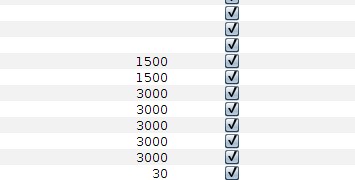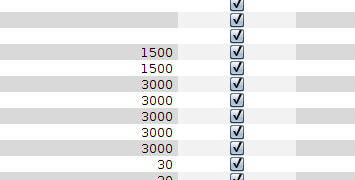I am using a JTable to visualize some data. One column ist destined to show boolean data through a checkbox. I achieved this by returning Boolean.class from my overriden getColumnClass() function in my table model.
Unfortunately this results in a cell with a checkbox but without a background color appropriate for the current row.

I fixed this by using the answer from this post: JTable - Boolean Cell Type - Background

Now I was trying to increase the contrast of the alternate rows. I achieved this by setting the appropriate property of the Nimbus LAF, which I am using.
UIDefaults defaults = UIManager.getLookAndFeelDefaults();
defaults.put("Table.alternateRowColor", new Color(217, 217, 217));

As you see, the background of the Boolean cells is still the old Nimbus Table.alternateRowColor color.
Is there a way to change this? Am I doing this completely wrong? Is there a better way to achieve alternating background color and more contrast?
EDIT
caused on
java version "1.7.0_17" Java(TM) SE Runtime Environment (build 1.7.0_17-b02) Java HotSpot(TM) Server VM (build 23.7-b01, mixed mode), OS is Ubuntu 12.04
I was (finally) able to get it to work. The secret was to change the defaults BEFORE you create anything.

import java.awt.BorderLayout;
import java.awt.Color;
import java.awt.Component;
import java.awt.EventQueue;
import javax.swing.JCheckBox;
import javax.swing.JComponent;
import javax.swing.JFrame;
import javax.swing.JLabel;
import javax.swing.JScrollPane;
import javax.swing.JTable;
import javax.swing.UIManager;
import javax.swing.UnsupportedLookAndFeelException;
import javax.swing.border.Border;
import javax.swing.border.EmptyBorder;
import javax.swing.plaf.UIResource;
import javax.swing.table.AbstractTableModel;
import javax.swing.table.TableCellRenderer;
public class TestTable10 {
public static void main(String[] args) {
new TestTable10();
}
public TestTable10() {
EventQueue.invokeLater(new Runnable() {
@Override
public void run() {
try {
UIManager.setLookAndFeel("com.sun.java.swing.plaf.nimbus.NimbusLookAndFeel");
} catch (ClassNotFoundException | InstantiationException | IllegalAccessException | UnsupportedLookAndFeelException ex) {
}
UIManager.getLookAndFeelDefaults().put("Table.alternateRowColor", Color.RED);
JTable table = new JTable(new MyModel());
((JComponent) table.getDefaultRenderer(Boolean.class)).setOpaque(true);
JFrame frame = new JFrame("Testing");
frame.setDefaultCloseOperation(JFrame.EXIT_ON_CLOSE);
frame.setLayout(new BorderLayout());
frame.add(new JScrollPane(table));
frame.pack();
frame.setLocationRelativeTo(null);
frame.setVisible(true);
}
});
}
public class MyModel extends AbstractTableModel {
@Override
public int getRowCount() {
return 10;
}
@Override
public int getColumnCount() {
return 2;
}
@Override
public Object getValueAt(int rowIndex, int columnIndex) {
switch (columnIndex) {
case 0:
return "Hello";
case 1:
return true;
}
return "?";
}
@Override
public Class<?> getColumnClass(int columnIndex) {
return columnIndex == 0 ? String.class : Boolean.class;
}
}
}
I'd be to use standard Renderer concept for this job, instead of playing with Nimbus Constants
Renderer works for Nimbus, override all Colors, excluding JTableHeader
code based on @camickrs Table Row Rendering

import java.awt.*;
import javax.swing.*;
import javax.swing.table.*;
public class TableRowRenderingTip extends JPanel {
private static final long serialVersionUID = 1L;
public TableRowRenderingTip() {
Object[] columnNames = {"Type", "Company", "Shares", "Price", "Boolean"};
Object[][] data = {
{"Buy", "IBM", new Integer(1000), new Double(80.5), Boolean.TRUE},
{"Sell", "Dell", new Integer(2000), new Double(6.25), Boolean.FALSE},
{"Short Sell", "Apple", new Integer(3000), new Double(7.35), Boolean.TRUE},
{"Buy", "MicroSoft", new Integer(4000), new Double(27.50), Boolean.FALSE},
{"Short Sell", "Cisco", new Integer(5000), new Double(20), Boolean.TRUE}
};
DefaultTableModel model = new DefaultTableModel(data, columnNames) {
private static final long serialVersionUID = 1L;
@Override
public Class getColumnClass(int column) {
return getValueAt(0, column).getClass();
}
};
JTabbedPane tabbedPane = new JTabbedPane();
tabbedPane.addTab("Alternating", createAlternating(model));
add(tabbedPane);
}
private JComponent createAlternating(DefaultTableModel model) {
JTable table = new JTable(model) {
private static final long serialVersionUID = 1L;
@Override
public Component prepareRenderer(TableCellRenderer renderer, int row, int column) {
Component c = super.prepareRenderer(renderer, row, column);
if (!isRowSelected(row)) { // Alternate row color
c.setBackground(row % 2 == 0 ? getBackground() : Color.orange);
}
return c;
}
};
table.setPreferredScrollableViewportSize(table.getPreferredSize());
((JComponent) table.getDefaultRenderer(Boolean.class)).setOpaque(true);
return new JScrollPane(table);
}
public static void main(String[] args) {
try {
for (UIManager.LookAndFeelInfo info : UIManager.getInstalledLookAndFeels()) {
if ("Nimbus".equals(info.getName())) {
UIManager.setLookAndFeel(info.getClassName());
break;
}
}
} catch (Exception e) {
return;
}
SwingUtilities.invokeLater(new Runnable() {
@Override
public void run() {
createAndShowGUI();
}
});
}
public static void createAndShowGUI() {
JFrame.setDefaultLookAndFeelDecorated(false);
JFrame frame = new JFrame("Table Row Rendering");
frame.setDefaultCloseOperation(JFrame.EXIT_ON_CLOSE);
frame.add(new TableRowRenderingTip());
frame.pack();
frame.setLocationRelativeTo(null);
frame.setVisible(true);
}
}
If you love us? You can donate to us via Paypal or buy me a coffee so we can maintain and grow! Thank you!
Donate Us With